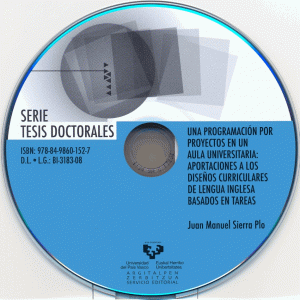Una programación por proyectos en un aula universitaria: aportaciones a los diseños curriculares de lengua inglesa basados en tareas
Authors
Year
ISBN
Publisher
Links

This thesis investigates the implementation of cooperative projects –which constitute the syllabus design unit that organizes the programme– for the teaching of English in a university context. In chapter 1, syllabus design for language teaching is reviewed from a historical and conceptual perspective. Different proposals and frameworks representative of task-based language teaching (TBLT) are analysed and conclusions drawn regarding fundamental aspects of this approach. The chapter goes on to demonstrate the scant regard given to implementing cooperative projects in TBLT, and a syllabus proposal is presented. This proposal defines a project which tries to integrate the psycholinguistic and educational rationale behind my research in the classroom. In chapter 2, the four hypotheses of this research are put forward, and the context and design of the investigation are described within the paradigm of action-research. Chapters 3 and 4 describe the retrospective programmes implemented by means of cooperative projects in two different university settings. The projects were carried out with the students participating and negotiating in the construction of both the programme and the assessment/evaluation scheme. The structure of the projects is set out, describing the characteristics of their sequencing in phases and providing the objectives, content and methodology for each of these different phases. The assessment/evaluation scheme for both projects specifies the assessment/evaluation used throughout the different phases of their implementation, stating the objectives, tasks, criteria, instruments and agents, as well as the different types of assessment used. Within this assessment/evaluation scheme, the opinions of the students participating in this curricular innovation were determined by means of three questionnaires. After an analysis of the results, conclusions are drawn from the implementation of the projects. In chapter 5, the conclusions regarding the hypotheses of this thesis are discussed, and a series of pedagogical implications for the implementation of project-based language teaching in tertiary education are put forward. A wide sample of the final products elaborated by the students can be found in chapter 7, as well as the planning, organization and assessment/evaluation instruments used in the research.
